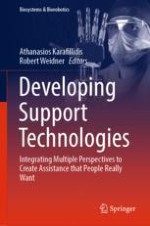2018 | OriginalPaper | Chapter
Engineering Collaborative Social Science Toolkits. STS Methods and Concepts as Devices for Interdisciplinary Diplomacy
Authors : Peter Müller, Jan-Hendrik Passoth
Published in: Developing Support Technologies
Publisher: Springer International Publishing
Activate our intelligent search to find suitable subject content or patents.
Select sections of text to find matching patents with Artificial Intelligence. powered by
Select sections of text to find additional relevant content using AI-assisted search. powered by
